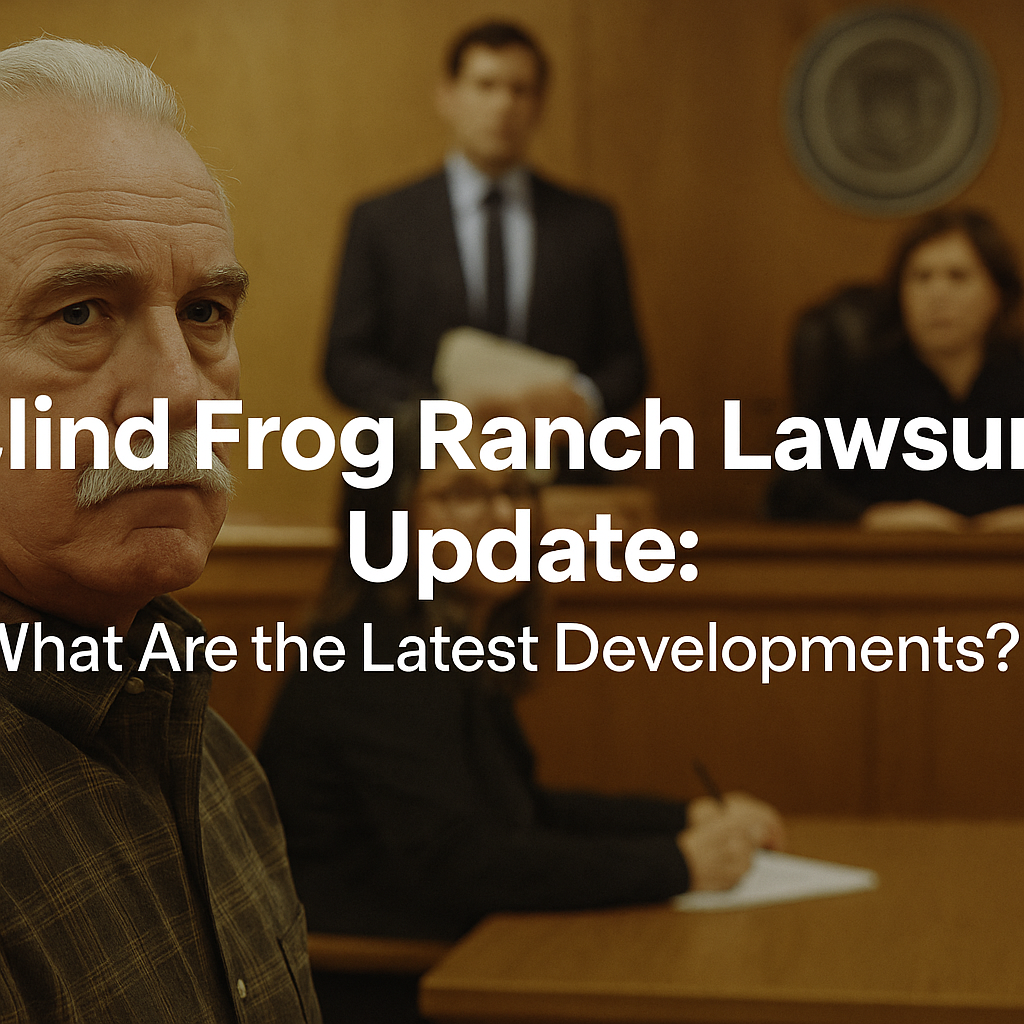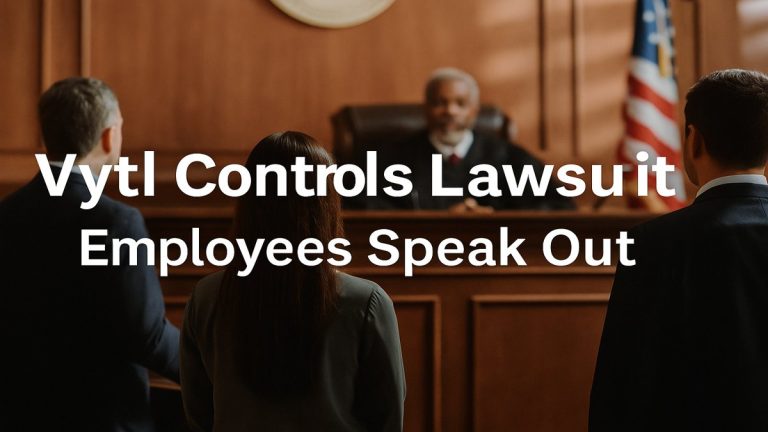The Blind Frog Ranch lawsuit update has taken the internet by storm. Everyone wants to know what’s happening at this mysterious Utah site. The Blind Frog Ranch lawsuit update reveals more than just a court case. It uncovers legal tensions, ownership drama, and ecological threats. Treasure hunting turned into a legal conflict. Questions about illegal mining, unapproved excavation, and unclear land titles now dominate headlines. State agencies, local communities, and TV fans are all involved. Some support the ranch’s work.
Others demand accountability. Confusion about who owns the ranch has only made things worse. Courts now dig deep into land records, permits, and environmental harm. With each update, more twists emerge. This article gives a clear, honest look at every angle. This is the most detailed overview of matters, from property fights to explosive claims. Let’s uncover the truth behind Blind Frog Ranch.
What Sparked the Legal Trouble at Blind Frog Ranch?
Duane Ollinger, known for his show “Mystery at Blind Frog Ranch,” claims he owns the property. However, official records say otherwise. The land is legally listed under “Ollinger Duane ETAL.” This small detail changes everything. It suggests co-ownership. Multiple people may have legal claims to the property. These claims create conflict around authority. Stakeholders question who controls access, mining rights, and profits.
This disagreement triggered the lawsuit. Some stakeholders challenge Ollinger’s right to mine or dig, arguing that he overstepped his authority. Courts are now reviewing who truly controls the land. Legal teams are also searching for older ownership contracts. Title history could unlock more complexity. If past transfers were incomplete, the whole case may shift.
Could Mining Without Permits Be the Core Issue?
Yes. One major complaint in this case is illegal mining. Allegations say Ollinger used heavy equipment and explosives. No official state or federal permits support these actions. If true, that could mean legal violations. Excavation reportedly took place across several acres. Authorities found altered terrain, exposed rock, and unapproved blasting.
Authorities say these activities may breach mining regulations, including laws covering safety, property use, and land disruption. Without proper permits, even treasure hunting becomes unlawful. The absence of permits may also lead to fines or criminal charges. Permit records are now under formal investigation. Agencies want to know whether requests were submitted and denied or ignored entirely.
Why Are Environmentalists Joining the Case?
Environmental concerns have intensified the lawsuit. Conservation groups and local regulators stepped in. They allege that unregulated excavation may harm the area. Reports claim sensitive habitats lie beneath the ranch’s surface. Digging could disrupt underground aquifers and plant biodiversity.
Concerns include water contamination and habitat destruction. The ranch lies in an ecologically sensitive zone, and disturbing the soil and water could cause irreversible damage. Chemical runoff from machinery may also affect nearby rivers. Locals have reported foul smells and color changes in water sources.
Experts say the area might also house protected species, which adds another legal layer. Violations under wildlife or environmental laws could carry heavy penalties. Investigators are testing soil and water samples now, and the results could escalate the situation further.
What Has the Court Decided So Far?
Courts responded immediately. A temporary injunction now blocks further digging. This means no excavation can happen until the court finishes its review. The injunction cites environmental risk and ownership confusion as primary reasons.
The lawsuit has entered a critical phase. Both sides have submitted documents and expert reports. Hearings are underway, and each session reveals more details about ranch operations. Lawyers argue over who approved past activities. Witnesses include geologists, former employees, and legal analysts.
Courts may require a full audit of all actions taken since the ranch’s media exposure began. That could involve financial records, land use logs, and equipment inventories. If unauthorized mining is confirmed, the penalty could reach millions.
What Is the Truth About Property Ownership?
Publicly, Ollinger claims full ownership. In contrast, county property records list the ranch under joint ownership. That listing uses the label “ETAL,” meaning “and others.” These unnamed parties may be family members, business partners, or silent investors.
So, who are these others? That remains unclear. Legal analysts say this is a key issue. Until the court clarifies ownership, the lawsuit will stay active. Title disputes complicate the case. Different owners may have different views on land use. Ownership clarity will also determine liability. If Ollinger acted without the co-owner’s consent, his legal exposure could grow. Courts might request notarized affidavits or prior contracts. The longer it takes to prove ownership, the more unstable the ranch’s future becomes.
Did the TV Show Add Fuel to the Fire?
Absolutely. The Discovery Channel show brought the ranch global attention. Treasure hunters, fans, and critics followed every dig. This publicity added pressure on authorities, and agencies faced demands to investigate quickly. Local officials started watching more closely, and environmental groups also raised questions. Was the ranch a real operation or just a television drama? Some believe scenes were scripted, while others say real excavation happened off-camera.
The show blurred those lines, fueling legal interest. Any action filmed without a permit could now count as evidence in court. Drones, GoPros, and handheld footage are being reviewed, and legal teams are scanning each episode frame by frame.
Are There Other Lawsuits Against the Ranch?
Yes. Sources indicate multiple legal complaints, including lawsuits from neighboring landowners. Some accuse the ranch of trespassing, others allege groundwater disruption, and two landowners claim fence lines were moved illegally. A few lawsuits focus on the show’s portrayal of certain events. Plaintiffs say the series misrepresented local customs and property boundaries. That could lead to defamation claims. Show producers may be named in these suits.
Some claims also involve alleged damage to sacred land. Indigenous groups have expressed concern. They say certain areas on the ranch hold cultural value. If proven, this could spark new federal cases.
What Environmental Laws Might Be Involved?
Several environmental laws could apply, including the Clean Water Act and the Endangered Species Act. If any excavation harms protected ecosystems, severe penalties could follow. Local wetland protections may also come into play. State environmental agencies also stepped in. They demanded an environmental impact report. So far, no such document has surfaced publicly. Lack of compliance with reporting rules may add another violation.
Experts say more laws could apply if explosives were used. These include regulations on hazardous materials and safe storage practices. If explosives were stored near water sources, that alone could be a major breach.
Could This Case Set a Legal Precedent?
Yes. This case might shape future land-use laws, especially when TV projects overlap with real land development. It could also impact how mining permits are enforced. Legal experts see this as a test case.
If the court rules against the ranch, others might face tighter regulations. Legal scholars say this could reshape the balance between entertainment and environmental duty. Landowners might need media-specific permits. In the future, states may require filming clearance alongside excavation approvals. That combination could become standard practice. Ranches with historic or ecological value will face greater scrutiny.
What Are the Financial Stakes?
High. Estimates suggest that operations at the ranch cost millions. The show adds another layer of value. Any legal ruling could affect future seasons. Producers may face financial loss if permits are denied.
Court penalties could also include damages. That means Ollinger might pay fines or compensation. Environmental restoration could cost even more. Replacing damaged trees, purifying water, or restoring soil can be expensive. Sponsors and networks are also watching. Negative outcomes could lead to contract cancellations. Insurance providers may also reconsider coverage terms. Investors in the show and ranch might pull funding.
Are Local Communities Affected?
Yes. Residents near the ranch raised complaints. Some say noise and dust from excavation affect their health. Others fear water pollution. Several families rely on nearby wells.
Tourism is another concern. Fans often visit the area, and some trespass or damage property. Locals want more protection and clarity. Law enforcement has increased patrols to manage the influx. Some businesses see more foot traffic. Others worry about long-term impacts. Roads wear down faster. Noise affects livestock. Schools have reported increased absenteeism on days with major filming.
Could There Be Criminal Charges?
Possibly. If illegal mining or environmental harm is proven, criminal charges could follow. That depends on what courts and investigators find. Charges could range from misdemeanors to felonies.
Prosecutors haven’t announced formal charges yet. But the case remains under review. State authorities monitor the Blind Frog Ranch Lawsuit Update closely. Some agencies have requested federal input. Lawyers expect that findings will determine severity. If Ollinger knowingly bypassed permits, charges are more likely. The use of explosives increases the chance of criminal review.
What Has Ollinger Said About the Lawsuit?
Publicly, he denies all wrongdoing. Ollinger says the ranch operates within legal boundaries. He also claims environmental steps were taken and that every move followed expert advice.
In interviews, he insists the show is factual and says critics misunderstand its purpose. Still, legal documents and evidence may tell another story, and testimony from contractors and former staff may contradict his statements. So far, Ollinger has not submitted detailed permits to the media. Critics say transparency would help his case. Without documentation, doubt continues to grow.
Have Investigations Revealed New Information?
Yes. Investigators discovered unregistered equipment on site. Some machinery lacked visible license numbers. That violates standard excavation laws. Officers also found unsafe fuel storage.
In addition, drone footage revealed larger excavation areas than reported. These images may become part of trial evidence. Time-stamped images show multiple unauthorized dig sites. Chemical traces found near excavation areas raised alarms. Experts now test for potential toxins. If any pollutants enter public water, a federal investigation may begin.
Why Are Legal Records So Hard to Find?
Many court documents are sealed, limiting public access. Some say this protects personal privacy, while others argue it hides key facts. Legal experts debate the practice. Analysts believe that more will surface during trial. Until then, full transparency remains lacking, limiting public understanding. Misinformation spreads quickly when facts are sealed. Several petitions now call for open court access. Activists want all legal filings published. Courts may consider unsealing documents in the public interest.
What Are Experts Saying About the Case?
Legal experts call it a complex web. Environmental lawyers stress the importance of permits. Property law scholars highlight unclear ownership. They warn future developers to avoid similar mistakes. Entertainment analysts add another layer. They say the show’s success relies on its legality. Any legal fallout could harm its future, and viewer trust is hard to rebuild. Academics view the ranch as a unique study. It blends media ethics, land law, and environmental science, and universities may use this case in future coursework.
What Questions Still Need Answers About the Blind Frog Ranch Lawsuit Update?
Many. The court must confirm exact ownership and decide if mining laws were broken. Environmental impacts need deeper investigation. Were permits ever applied for? The future of the show also remains uncertain. Producers may face scrutiny. Contracts could change if legal violations are confirmed. Networks may pause future episodes. Even insurance claims now face a delay. Some underwriters want more clarity. Lawsuits and coverage gaps create high financial risk.
Where Can Readers Follow the Case?
Reputable sources include:
- LawJudicial.com
- BT Plus One
- LawGud.com
- MesotheliomaLawyerVimeo.org
These platforms offer updates. Court filings and investigative journalism reveal new angles. Local Utah news sites also provide regional perspectives. Keep checking official court press releases.
What Makes This Case So Unusual?
It blends entertainment, legal conflict, and ecological concerns—a rare mix. Treasure hunting rarely leads to federal court, but this ranch crossed legal thresholds. Yet here it is. The ranch became a legal symbol. It shows how quickly media fame can lead to legal chaos. Viewers may never see the behind-the-scenes impact. Production companies now study the case closely. They see it as a cautionary tale. Reality TV must now consider legal and ecological implications.
Could the Ranch Recover from All This?
Maybe. If courts rule in its favor, operations could resume. But that depends on environmental reviews. Future episodes may need stricter regulations, and permit applications may include new sections.
Tourism might stay strong, and fans remain curious. But legal and environmental compliance will shape the ranch’s future, and even merchandise sales could face changes.
Some experts suggest rebranding the show. A new focus on legal transparency might rebuild public trust.
How Will This End?
That’s still unknown. Courts move slowly. Evidence takes time to review. But one thing is clear: this case will leave a mark. Every legal detail shapes the ranch’s fate.
Public interest remains high. Environmental and legal groups continue to monitor progress, and media outlets prepare for long-term coverage.
Frequently Asked Questions (FAQs) About the Blind Frog Ranch Lawsuit
What triggered the Blind Frog Ranch lawsuit?
Ownership confusion and alleged illegal mining caused the legal dispute. Disagreements over land rights and excavation activities led to the lawsuit.
Who actually owns Blind Frog Ranch?
Public records list Duane Ollinger as one owner, but “ETAL” suggests others also hold legal claims. The court is still reviewing the whole ownership chain.
Did the TV show break any laws?
Possibly. Some excavation seen on the show may have occurred without proper permits. This footage could now be used in court.
Are environmental concerns legitimate?
Yes. Experts believe excavation risks water contamination and habitat loss. Soil and water tests are underway to confirm the damage.
What happens if illegal mining is proven?
The ranch could face large fines or be shut down. Duane Ollinger may also face criminal charges if he violated mining or safety laws.
Will the show continue airing during the lawsuit?
That is uncertain. Networks are reviewing contracts. Future episodes depend on court rulings and possible permit approvals.
Why are court documents sealed?
Some records are sealed to protect personal information. However, public pressure may lead to more transparency during the trial.
Can visitors still tour the ranch?
Access is now restricted. Ongoing legal issues and the temporary injunction mean the site remains under monitoring.
Has the case affected the local community?
Yes. Residents complain about noise, traffic, and pollution. Some welcome tourism income, but others worry about the long-term impact.
What will happen next in the lawsuit?
More hearings are scheduled for 2025. Before ruling, the court will review permits, ownership documents, and environmental reports.
Conclusion: What Does the Blind Frog Ranch Lawsuit Update Reveal?
The Blind Frog Ranch lawsuit update exposes more than legal paperwork. It uncovers serious gaps in ownership, land use, and environmental care. Public records challenge Duane Ollinger’s control. Missing permits raise serious questions. Environmental risks are no longer hidden.
Every development matters. The Blind Frog Ranch lawsuit update reflects rising concern over how fame intersects with the law. TV cameras can’t hide broken rules. Viewers deserve the truth. Lawmakers demand accountability. Residents ask for peace. As new hearings unfold, pressure builds. Evidence will decide what comes next. Justice must be based on facts, not ratings. If violations are confirmed, changes will follow. This case could set new rules across media and land ownership.
Stay informed. Trust facts. The Blind Frog Ranch lawsuit update continues to evolve. Each update brings us closer to the truth, resolution, and responsibility.
Ayesha Awais is a content writer for JudicialNexus.com, covering accident reports, injury-related news, lawsuits, and public safety updates. All content is informational in nature and based on publicly available sources.




